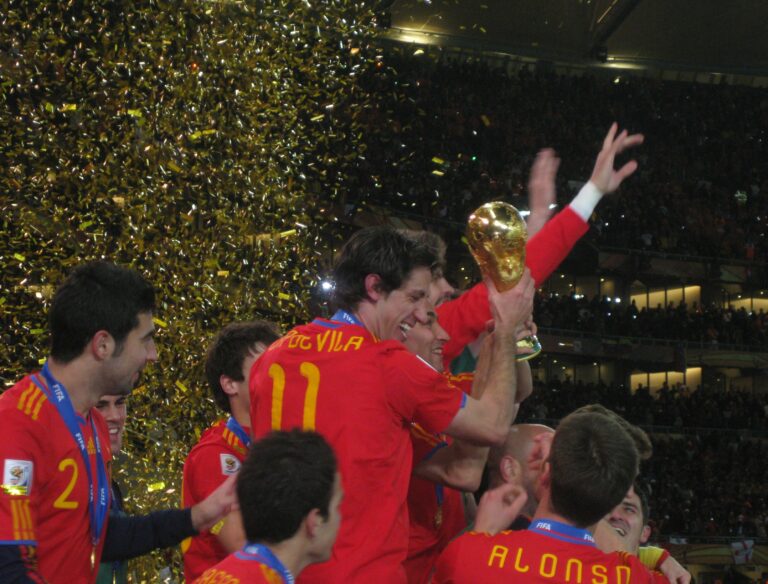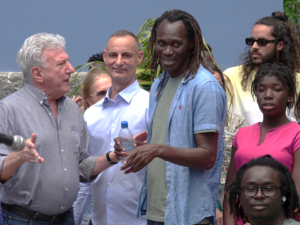With very limited precolonial links to Africa except for a couple of former colonial outposts in northern and western parts of the continent, most Spaniards visiting Africa for the first time are often surprised to see how familiar some Africans are with their country. Many wonder and often ask how we came to be so passionately connected to a faraway country that has insignificant historical connections with us. And guess who does all this behind-the-scenes ambassadorial job of marketing Spain to Africa- its Spanish football.
Africa and Spanish Football
Here in soccer-mad Africa digital satellite television channels that screen live matches from different leagues and countries from around the world are bringing the game right to the doorsteps of soccer fans, In many African countries, The La Liga Santander, Spain’s top-flight football is rivaled perhaps only by the English Premier League in terms of popularity and number of fans. Some watch the games at home while those who cannot afford television subscriptions watch the games in pubs, sports bars, beer gardens, and even backyard theatres made of improvised materials and equipment.
The presence of so many African players playing football in Spain has aroused more interest from African soccer fans who always follow the progress of their superstars in the Spanish lower and elite football leagues. For instance here in Zimbabwe when national team striker Tino Kadewere joined Laliga side Real Mallorca in 2022, there was a marked increase in the number of Zimbabweans seen with replica jerseys of his new Spanish football club. In African countries especially in North and West Africa where more football players are plying their trade in Spain, the passion for Spanish football and Spain in general is more intense and passionate.
Watching Laliga Games
And “When it’s match day in the Laliga, it’s always a full house here despite the apparent lack of comfort”. Johanne, 41, a bartender in a beer hall in Chiredzi, Zimbabwe explained, “On El Classico nights, I have to charge an entrance fee to limit the number of people who get into the bar”.
Just like in many countries around the world, FC Barcelona and Real Madrid are among the most popular Spanish football teams in Africa. Here in Zimbabwe, an El Classico victory for either of the teams can be celebrated all night long by boozing, dancing, or hooting cars in the streets. Nonetheless, FC Barcelona and Real Madrid are not the only beloved teams in Africa. Many other big and small Spanish football clubs have their Africa-based die-hard fans who follow their team’s progress week in and week out. During live matches, they wear replica jerseys of their favorite clubs and throng sports bars or beer gardens where they passionately cheer their clubs.
Football as Spain’s Roving Ambassador
In a way, Spanish football has brought Spain to the African continent. Besides watching football matches, staunch football fans also watch documentaries of their favorite Spanish football clubs. These documentaries have helped many people to learn more about the history of their favourite Spanish football clubs, their home cities, and even some history and geography of Spain.
“For a start, most Spanish clubs have names of their home towns or cities and if you know the club name it becomes easier to know the Spanish city or town your team is based”, Emmanuel 38, an FC Barcelona fan and Nigerian immigrant in Zimbabwe who sells car parts in downtown Harare lectured me. “I have followed Spanish Football for so long now that I know a bit about Spanish culture or even politics than many people in Europe”.
The love for Spanish football is not only about the Spanish football club. Thanks to the fans, and familiarity with Spanish football stars, the Spanish national football team is now also a favorite for many neutral African fans as long it is not playing against an African team. During the 2010 World Soccer World Cup tournament that was hosted by our neighbor South Africa, I watched a couple of Spain’s matches. In the stadiums, Spanish fans and players alike were amazed by the support and sympathy that La Furia Roja got from African fans during the tournament.
In the finals that featured Spain and The Netherlands, it was obvious that most neutral fans were gunning for the Los Toros. In South Africa, Spain’s victory was enthusiastically celebrated by many Africans in Africa because of their familiarity with Spanish football players. In some African countries, some quick-thinking entrepreneurs were able to see the business side of Spain’s victory in the 2010 World Cup and they quickly flooded the market with replica jerseys of La Furia Roja. Today, almost a decade and a half later, replica jerseys of La Furia Roja with names of the 2010 tournament’s Spanish stars like Xavi, Puyol, Iniesta, David Villa, Casillas and Gerard Pique can still be seen in many African streets and villages.
Spaniards and African Football Fans
“The 2010 tournament was the first and so far the last time the World Cup Soccer Finals were hosted by an African country and it happened when Spanish football was on the accent”, explained Mandla, a 46-year-old driver based in Musina, South Africa. “Their passing and attacking style excited African football fans and that is why those Spanish players are still idolized in Africa today.
In many African countries, replica jerseys, club flags on cars or buses, and posters of Spanish football legends are a common sight. These Spanish football memorabilia items coupled with the presence of so many fans of Spanish football make it easy for visiting Spaniards to feel at home away from home. And when you are in Africa, it doesn’t matter which club you support back home or which town or city you are coming from because there will always be something or someone that reminds you about Spain in one way or another.
Author: Cecil Dzwowa.




